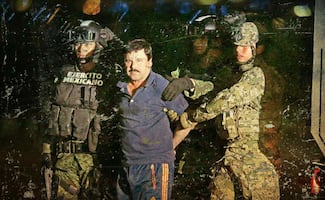Más Información

Semar asegura laboratorio clandestino y bodega; señalan que pertenece a "Los Rugrats", brazo armado del Cártel de Sinaloa

SESNSP reporta baja en delitos de alto impacto; resalta disminución de homicidio doloso en 26 estados

Morena se deslinda de dichos de vocera de su partido en la CDMX; narco es uno de los principales empleadores en México, dijo

Operativo “Cisne Negro”, túneles y una película frustrada; así narró EL UNIVERSAL la recaptura de “El Chapo” hace 10 años

Parlamento de Venezuela declara "héroes y mártires" a los muertos en ataque de EU; se creará un "monumento conmemorativo"
A group of bereaved parents who overcame government apathy to uncover one of the largest mass graves in the dark history of Mexico's drug war have also exposed the government's slow progress in attending to rights abuses and victims.
After a six-months plus investigation led by the families, government investigators in the Gulf state of Veracruz said on Tuesday they had found more than 250 skulls in shallow graves in a field, a record in the atrocities in Mexico.
On Thursday, reporters gained access for the first time to the lush tropical area spotted with lagoons, which is near a current major expansion of Veracruz city's busy seaport.
The site was uncovered last year after a tip to members of Colectivo Solecito, one of several groups of frustrated relatives searching for the tens of thousands of people who have gone missing during the gang drug wars and whose cases are unsolved.
"The authorities don't care about searching. Here, those who search are the parents," said Rosalia Castro, who has been looking for her son since 2011. "The attention of the prosecutor's office has been zero."
Critics say the groups' success in uncovering evidence of atrocities leaves authorities looking slow-footed and highlights the dismal human rights record of Mexican President Enrique Peña Nieto's Institutional Revolutionary Party (PRI). Veracruz was ruled until late last year by PRI state governor Javier Duarte.
The case is also a reminder that while U.S. President Donald Trump's controversial immigration policies and planned border wall has provided a distraction from Mexico's woes, crime and corruption continue to dog the party that hopes to stay in power in presidential elections next year.
Under Duarte, victims disappeared at the hands of gangs with the complicity of authorities, said Jorge Winckler, Veracruz state's attorney general and a member of the opposition-led state government that took office in December.
Winckler said three officials from Duarte's government were under investigation for failing to properly search for bodies at the site.
Peña Nieto's administration last year issued an arrest warrant against Duarte, who is charged with embezzlement. Duarte fled and has not been caught, so it was not possible to seek comment from him on the Veracruz mass grave.
The federal attorney general's office has not taken over the investigation of the graves site, but is offering technical support, a spokesman said on Friday.
The federal government's top human rights official, Roberto Campa, did not immediately respond to a request for comment.
The U.N. Special Rapporteur on extrajudicial killings last year criticized widespread extrajudicial executions perpetrated by security forces and members of cartels in Mexico and said such crimes were rarely punished. The Mexican government says its goal is to achieve human rights for all.
MORE REMAINS MAY BE FOUND
At the grave site on Thursday, Winckler said teams were likely to find more remains, possibly in the area of the port expansion. But he said authorities needed additional resources to conduct the massive forensic investigation.
Behind him, small groups of family members and police poked into the ground with poles, feeling for human remains beneath the soil as they slowly worked their way across two-meter by two-meter plots.
Veracruz state says up to 2,600 people have disappeared under suspicious circumstances since 2010, at the start of Duarte's term. The Mexican government estimates some 27,000 people have gone missing nationwide since drug-related violence surged a decade ago.
Relatives of the missing in Veracruz say state authorities were apathetic when they sought help in finding out what happened to their loved ones.
Residents near the grave site, just outside a lower middle-class housing development called Colinas de Santa Fe, said that as far back as four years ago they noticed pickup trucks coming and going at strange hours and sometimes heard gunshots.
"I know there will be no justice, only divine justice. From that, you cannot escape," said Griselda Barradas, whose son Pedro Huesca Barradas is one of only two sets of remains identified among the 250 found at the 20-hectare (49-acre) site.
Barradas, whose police investigator son went missing four years ago, said that during a protest march on Mother's Day last May, two young men were handing out pamphlets to the crowd.
"I didn't make much of it until the next day when I took a good look and realized it was a sketch, a very detailed map of how to get to the place and that there was a lagoon with many bodies," she said.
The group convinced authorities to let them search the area last August, along with state forensic investigators.
Grieving relatives had been unsuccessful for years in getting local authorities to investigate drug war killings in Mexico.
The 2014 disappearance of 43 student teachers in Guerrero state marked a turning point after impromptu search parties uncovered unrelated burial sites across the country.
Guadalupe Contreras' son disappeared in 2013 in Guerrero, which has seen a spike in violence and heroin production, and the father joined search parties there last year. Now he is helping in Veracruz.
"Before it was much more difficult. We were ignorant of what happened and how to search. But we taught ourselves and now we are also teaching others," Contreras said.
Noticias según tus intereses
[Publicidad]
[Publicidad]









